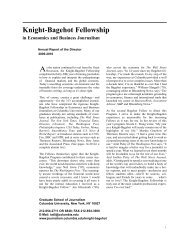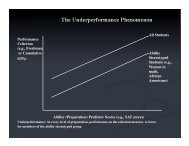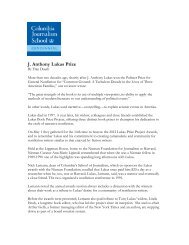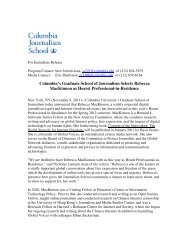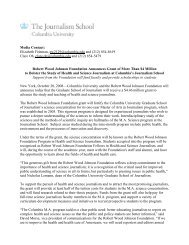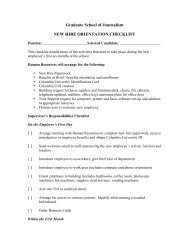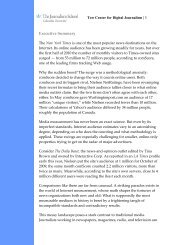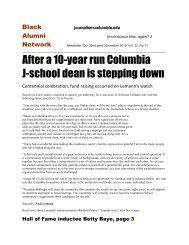Read her speech - Columbia University Graduate School of ...
Read her speech - Columbia University Graduate School of ...
Read her speech - Columbia University Graduate School of ...
You also want an ePaper? Increase the reach of your titles
YUMPU automatically turns print PDFs into web optimized ePapers that Google loves.
Joanna Connors<br />
First, I want to congratulate all <strong>of</strong> you on your achievement today, and along with all <strong>of</strong> my<br />
colleagues I want to welcome you to a pr<strong>of</strong>ession I love, and that I know is <strong>her</strong>e to stay. So that’s<br />
my pep talk.<br />
But <strong>her</strong>e’s what I really want to talk about.<br />
It’s somewhat ironic that I am <strong>her</strong>e receiving the Mike Berger Award, because my message to<br />
you today is to learn the value <strong>of</strong> taking time to develop important stories. As you know, Mike<br />
Berger became famous for reporting on a mass murder in Camden, New Jersey in 1949, going to<br />
the scene that morning, talking to dozens <strong>of</strong> witnesses, and writing a 4000-word story, making<br />
deadline by 9:30 that night. It’s amazing stuff, and we all study it as a classic <strong>of</strong> reporting and<br />
writing.<br />
T<strong>her</strong>e is obviously an important place in journalism for fast reporting – we all work on deadlines<br />
and we all need to get the story first, in increasingly tough competition. And this is <strong>of</strong> course<br />
your primary job.<br />
But I want to suggest to you that perhaps a more important aspect <strong>of</strong> your career will be to<br />
preserve the tradition <strong>of</strong> the long-form narrative, the stories that evolve out <strong>of</strong> the daily reporting<br />
and add context and perspective and detail. Some say this is a dying form, that in the age <strong>of</strong><br />
Twitter and live blogging, news organizations don’t have the time or space to devote to these<br />
stories. I’m <strong>her</strong>e to tell you that these stories are still essential to our pr<strong>of</strong>ession, and might even<br />
save it.<br />
The story that brought me <strong>her</strong>e today evolved over months, starting in January <strong>of</strong> 2009, and<br />
running in the paper the following December.<br />
On a snowy Wednesday morning not long after Christmas, a Kent State <strong>University</strong> pr<strong>of</strong>essor,<br />
Trudy Steuernagel, was found beaten and unconscious on <strong>her</strong> kitchen floor. S<strong>her</strong>iff’s deputies<br />
found <strong>her</strong> 18-year-old son hiding in a small room in the basement. He could not tell them what<br />
happened.
Trudy’s son, Sky Walker, was severely autistic, and had become increasingly violent as a<br />
teenager. His fat<strong>her</strong> had remarried. Trudy, all alone with Sky, knew she was in danger. But she<br />
loved <strong>her</strong> son so much, and was so afraid <strong>of</strong> institutionalizing him, that she loved with the<br />
danger and kept it secret.<br />
A week after the deputies found <strong>her</strong>, Trudy died. Sky was charged with murder and held in the<br />
county jail, w<strong>her</strong>e he wailed, “Hurt Mama,” and spit and lashed out at jailers who tried to control<br />
him. He remained isolated, in a tiny cell, for months.<br />
What no one knew, including law enforcement, is that Trudy predicted <strong>her</strong> own death. In a letter<br />
<strong>her</strong> brot<strong>her</strong> found in <strong>her</strong> home safe, she asked authorities to pardon Sky. It was not his fault, she<br />
wrote, it was <strong>her</strong> fault and the result <strong>of</strong> failures in the mental health system.<br />
The family never intended for anyone to see that letter. Yet it became the lede <strong>of</strong> my story, and<br />
generated an important debate in the autistic community about the violence that can emerge<br />
when autistic children reach puberty. I discovered that Trudy was not alone, and that this was not<br />
a unique and rat<strong>her</strong> sensational story. I found that many parents, out <strong>of</strong> their immense love for<br />
their children, conceal and downplay the explosive behavior in their homes.<br />
How did I persuade Trudy’s family to tell me about the letter, and then give me a copy. The key<br />
was time. At first no one in the family would speak to “the media,” but as the months went on,<br />
fewer and fewer reporters kept going to the court hearings. Eventually, I was the only one t<strong>her</strong>e. I<br />
spent a lot <strong>of</strong> hours with the. I listened to them. I gained their trust that I would tell Sky’s story<br />
fairly and accurately, and in a way that might help ot<strong>her</strong> families going through similar<br />
situations.<br />
Taking all <strong>of</strong> this time on a story required the support <strong>of</strong> my editors, <strong>of</strong> course, editors committed<br />
to the idea that these deeply reported stories have value to readers and the community.<br />
The Plain Dealer is struggling with the same financial realities that have hit every ot<strong>her</strong><br />
newspaper. We’ve had buy-outs and lay<strong>of</strong>fs. But our editor, Susan Goldberg, has also decided to<br />
devote some <strong>of</strong> our resources to these stories.<br />
<strong>Read</strong>ers tell us they want them. Every time we run a long-form narrative, we get an enormous<br />
response. The emails and online comments tell us something that we all, as journalists, need to<br />
remember: People are hungry not just for headline news and information, but for understanding,<br />
for the stories that connect us as human beings and tell us something about who we are.<br />
So as you start what I hope will be great and exciting careers as journalists, remember:<br />
Concentrate on your deadlines and get those daily stories. But always fight for the opportunities<br />
to tell the stories that take time and patience.<br />
May 2010



